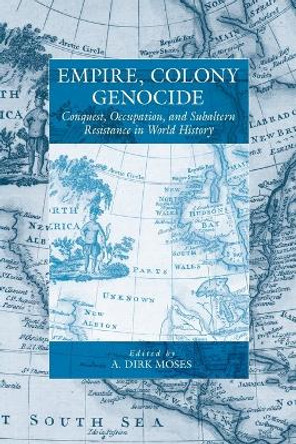Description
Historically delineates the problems of genocide as a concept in relation to rival categories of mass violence.
About the Author
A. Dirk Moses is the Frank Porter Graham Distinguished Professor in Global Human Rights History at the University of North Carolina, Chapel Hill. He is the co-editor of Decolonization, Self-Determination, and the Rise of Global Human Rights Politics (2020) and The Holocaust in Greece (2018).
Reviews
'This refreshingly original book turns the problem of genocide on its head. Contrariwise to international law and the dominant memory regimes, Moses points at the aspiration for permanent security as the crux of the matter. Passionate and historically sweeping.' Maria Malksoo, author of The Politics of Becoming European: A Study of Polish and Baltic Post-Cold War Security Imaginaries
'A pioneer of genocide studies, A. Dirk Moses has written a terrific, transgressive book destined to upend the field he has helped to define. Uncomfortable with morality tales, Moses is intent on smashing the hierarchy of international crimes established in the aftermath of World War II. A gut punch to conventional wisdom, this is critical global history at its best.' Jens Meierhenrich, author of Lawfare: A Genealogy (forthcoming)
'This brilliant, closely argued, and exhaustively referenced book makes a deeply persuasive case for replacing the prism of genocide with the crime of permanent security, calling out the multiple standards at play in the global order. A seminal paradigm-changer.' Nandini Sundar, author of The Burning Forest: India's War Against the Maoists
'Dirk Moses is the most original and provocative scholar writing on the problem of genocide. At its core deeply humanitarian, his book challenges every comfortable assumption of the meaning of genocide. This is essential reading for everyone concerned with human rights and mass atrocities.' Eric D. Weitz, author of A World Divided: The Global Struggle for Human Rights in the Age of Nation-States
'The Problems of Genocide can be strongly recommended to readers of this journal who have an interest in the macro-issues relating to criminal law and criminal justice, broadly conceived.' David O. Friedrichs, Rutgers
'Highly recommended.' A. Kolin, Choice Magazine
'... The Problems of Genocide is possibly one of the most significant works on the intellectual history of genocide ever since the notion entered the realm of the history of ideas.' Dimitrios A. Kourtis, Journal of Conflict and Security Law
'Moses' study makes numerous contributions to various literatures and disciplines ... The author postulates a paradigm shift in genocide research, security studies and international law ... [His] book is necessary and admirable.' Norbert Finzsch, H-Soz-Kult
'What's in a name? Why and how does it matter whether a particular situation is designated a genocide? And why is it problematic for us to categorise mass violence in this way? Dirk Moses' important new book ... addresses these questions head on with an elegantly argued and intricate treatment of the problems at the heart of what he terms the 'language of transgression' - the concept and discourse of genocide ... a rich, satisfying and provocative read.' Rachel Kerr, International Journal of Military History and Historiography
Book Information
ISBN 9781107103580
Author A. Dirk Moses
Format Hardback
Page Count 610
Imprint Cambridge University Press
Publisher Cambridge University Press
Weight(grams) 982g
Dimensions(mm) 229mm * 152mm * 33mm







